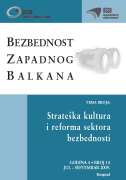Makedonska strateška kultura i internacionalni izbor: integracija ili izolacija
Macedonian Strategic Culture And Institutional Choice: Integration Or Isolation?
Author(s): Stojan SlaveskiSubject(s): Politics / Political Sciences
Published by: BCBP Beogradski centar za bezbednosnu politiku
Keywords: Macedonia; strategic culture; EU; NATO; security policies.
Summary/Abstract: Whereas political culture affects political behaviour as such, Strategic Culture works in the realm of security policy. It helps identify a frame of decision-options held by a country’s decisionmakers. In Macedonian case, having obtained independence by peaceful means, the political leadership started the process of building its security policy to cover all the aspects of complex approach to security. According to the National Security and Defence Concept, a lasting interest of the Republic of Macedonia is “the maintenance and upgrading of the national identity” while the vital interests by which the security situation in the country is improved and conditions are created for better life of the citizens, are “political and economic integration in the European Union, as well as political-defence integration in the NATO”. Hence, the EU and the NATO membership rank among the few projects around which both majority and minority communities come together. However, “the name issue” has been plaguing the country’s relations with Greece (and, consequently, with the EU and the NATO) since the early 1990s. Decisions taken at Bucharest Summit to block Macedonian integration into the NATO caused a huge disappointment among the Macedonian citizens of all ethnic groups. The failure to join the NATO was a particular disappointment for the Albanians, for whom the American-led alliance holds both a security and emotive attraction. Many now do not like having to pay the cost to protect the name of the country that means “nothing to them, but means everything to the country’s majority”. A disappointment in the NATO accession has an immediate impact on the credibility of the EU perspective as well, leading to the “disintegration of the Euro-Atlantic integration myth” that has sustained shaky Ohrid peace. There is a real danger that nationalism and ethnocentrism will be on the rise. In this situation Macedonia is facing strategic choice to compromise on the name issue and integration in the Euro-Atlantic structures or to continue its hard policy on the “name issue” that can lead to isolation of the country from the Euro-Atlantic flows.
Journal: Bezbednost Zapadnog Balkana
- Issue Year: 2009
- Issue No: 14
- Page Range: 39-55
- Page Count: 17
- Language: Serbian

